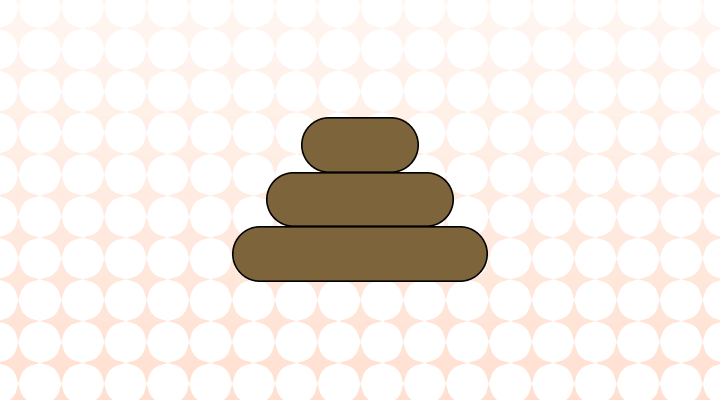'똥', '대변'은 영어로 맥락에 따라 poop, poo, crap, number two, feces, dung, droppings, manure로 표현합니다.


'똥'이나 '대변'을 의미하는 단어들에는 정말 여러 가지가 있는데요, 각각 어떤 맥락에서 어떻게 사용되는 것인지 아래에서 예시와 함께 자세히 알아보도록 합시다.
Poop
Poop은 몸에서 나오는 고체의 오물을 뜻합니다. 주로 북미에서 일상적인 맥락(=비격식)에서만 사용됩니다.
예시 문장
- The dog left a pile of poop in the backyard. (강아지가 뒷마당에 똥 무더기를 남겨놓았다.)
- He flushed the toilet to get rid of the poop. (그는 대변을 처리하기 위해 변기 물을 내렸다.)
- The child proudly announced that he had done his poop in the potty. (아이는 유아용 변기에 똥을 쌌다고 자랑스럽게 선언했다.)
Poo
Poo는 몸에서 나오는 고체의 오물을 뜻하는 주로 영국에서 쓰이는 표현입니다. 일상적인 맥락(=비격식)에서만 사용됩니다.
예시 문장
- She giggled at the word "poo" during the children's book reading. (그녀는 어린이용 책을 읽는 동안 "똥"이라는 단어에 꺄르르 웃었다.)
- The baby's diaper was full of gooey green poo. (아기의 기저귀는 끈적한 초록색 똥으로 가득했다.)
- The prankster left fake poo on his friend's doorstep as a practical joke. (그 장난꾸러기는 장난으로 친구의 현관에 가짜 똥을 두었다.)

Crap
Crap은 사람의 몸에서 나오는 고체의 오물인 똥을 뜻하는 무례한, 비격식체의 단어입니다.
예시 문장
- He cursed under his breath when he stepped in dog crap. (그는 개똥을 밟았을 때 욕설을 읊조렸다.)
- He cleaned up the horse crap from the stable floor. (그는 마굿간 바닥의 말똥을 치웠다.)
- I couldn't answer the phone because I was taking a crap when you called. (너가 전화했을 때 똥 싸고있어서 전화를 받을 수가 없었어.)
Number Two
Number two는 몸에서 나온 고체의 오물인 대변을 완곡하게 일컫는 표현으로, 일상적인 맥락(=비격식)에서만 사용됩니다.
예시 문장
- She hurried to the bathroom, feeling the urge to do a number two. (그녀는 대변 욕구를 느끼며 화장실로 서둘렀다.)
- He excused himself to go to the bathroom for a number two. (그는 대변을 보러 화장실에 다녀오겠다고 사과했다.)
- She apologized to her guests for the smell after someone did a number two in the bathroom. (그녀는 누군가가 화장실에서 대변을 본 후에 화장실에서 나는 냄새로 손님들에게 사과했다.)

Feces
Feces는 장을 통해 인간이나 동물의 몸에서 나온 고체의 오물을 뜻합니다. 격식있는 맥락에서 사용됩니다.
Feces는 북미식의 철자 표기이고 영국 영어에서는 faeces로 표기합니다.
예시 문장
- The biologist studied the feces of the endangered species to monitor their health. (그 생물학자는 멸종위기종들의 건강을 추적관찰하기 위해 대변을 연구했다.)
- He wore gloves while cleaning up the cat's feces from the litter box. (그는 애완동물용 변기에서 고양이의 대변을 치우는 동안 장갑을 꼈다.)
- The vet examined the dog's feces to check for signs of illness. (수의사는 질병의 징후가 있는지 확인하기 위해 강아지의 변을 검사했다.)
Dung
Dung은 동물로부터 나온 고체의 오물(=대변)으로, 특히 소나 말의 것을 가리킵니다.
예시 문장
- The gardener used cow dung as fertilizer for the vegetable garden. (정원사는 소똥을 채소밭의 비료로 사용했다.)
- She avoided stepping in the pig dung while walking through the barnyard. (그녀는 농장 마당을 걷는 동안 돼지 똥을 밟지 않도록 피했다.)
- The dung heap attracted flies and other insects to the farm. (똥 무더기는 파리들과 다른 곤충들을 농장으로 끌어모았다.)
Droppings
Droppings는 동물들과 새들로부터 나온 고체의 오물을 의미합니다.
예시 문장
- She swept the pigeon droppings from the windowsill to keep it clean. (그녀는 창틀을 깨끗하게 유지하기 위해 비둘기 똥을 쓸었다.)
- He avoided sitting under the tree to prevent bird droppings from landing on him. (그는 자신에게 새똥이 떨어지는 일이 없도록 나무 아래에 앉는 것을 피했다.)
- The janitor cleaned up the mouse droppings from the storage room. (청소부가 창고실의 쥐똥을 청소했다.)
Manure
Manure은 동물로부터 나온 고체의 오물이며 식물들이 잘 자라도록 땅에 뿌리는 것으로, 특히 말의 것을 가리킵니다.
예시 문장
- The farmer spread cow manure on the fields to fertilize the crops. (농부는 농작물에 비료를 주기 위해 밭에 소똥을 뿌렸다.)
- He shoveled horse manure into the wheelbarrow to transport it to the fields. (그는 말똥을 밭으로 옮기기 위해 외바퀴 수레에 퍼담았다.)
- The farmer used sheep manure as organic fertilizer for the orchard. (농부는 양의 똥을 과수원을 위한 유기농 비료로 사용했다.)
마치며...
'똥', '대변'을 영어로 쓸 때 어떤 표현이 적합한 지 헷갈린다면 AI 영어 문법 검사기 엔그램을 사용해보세요. AI가 문법 오류와 어색한 표현을 자연스럽게 고쳐줍니다.

항상 쓰던 단어만 써서 영문이 단조롭다면 엔그램 패러프레이즈를 사용해보세요. AI가 새로운 어휘와 문장 구조를 추천해줘 영어 수준을 한단계 높여드립니다.

참고자료:
https://dictionary.cambridge.org/dictionary/english/poop
https://dictionary.cambridge.org/dictionary/english/poo
https://dictionary.cambridge.org/dictionary/english/crap
https://dictionary.cambridge.org/dictionary/english/number-two
https://dictionary.cambridge.org/dictionary/english/feces
https://dictionary.cambridge.org/dictionary/english/faeces
https://dictionary.cambridge.org/dictionary/english/dung
https://dictionary.cambridge.org/dictionary/english/manure
https://dictionary.cambridge.org/dictionary/english/droppings












